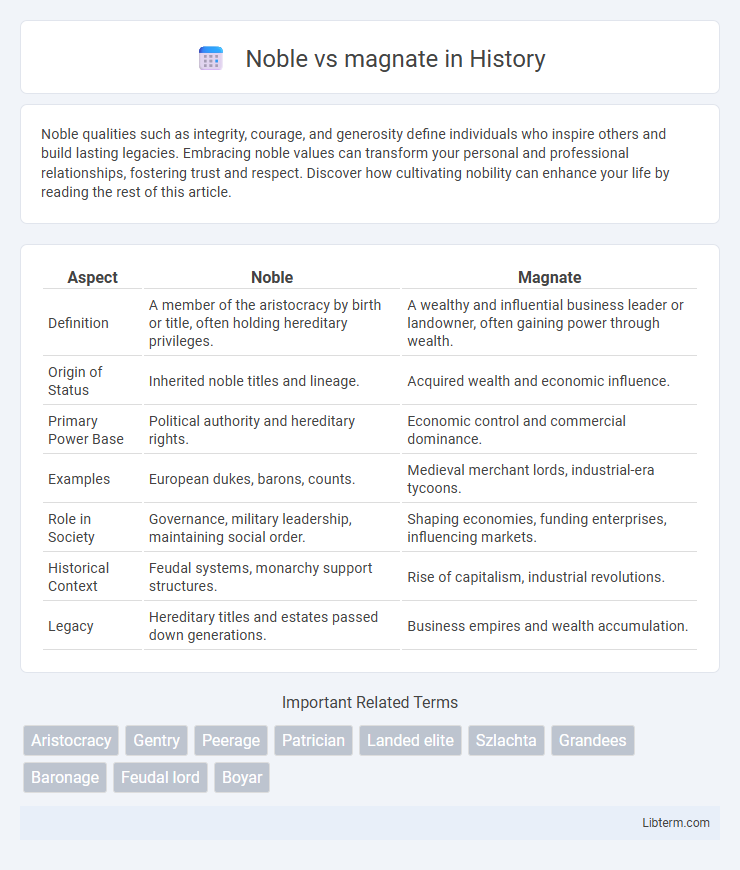Noble qualities such as integrity, courage, and generosity define individuals who inspire others and build lasting legacies. Embracing noble values can transform your personal and professional relationships, fostering trust and respect. Discover how cultivating nobility can enhance your life by reading the rest of this article.
Table of Comparison
| Aspect | Noble | Magnate |
|---|---|---|
| Definition | A member of the aristocracy by birth or title, often holding hereditary privileges. | A wealthy and influential business leader or landowner, often gaining power through wealth. |
| Origin of Status | Inherited noble titles and lineage. | Acquired wealth and economic influence. |
| Primary Power Base | Political authority and hereditary rights. | Economic control and commercial dominance. |
| Examples | European dukes, barons, counts. | Medieval merchant lords, industrial-era tycoons. |
| Role in Society | Governance, military leadership, maintaining social order. | Shaping economies, funding enterprises, influencing markets. |
| Historical Context | Feudal systems, monarchy support structures. | Rise of capitalism, industrial revolutions. |
| Legacy | Hereditary titles and estates passed down generations. | Business empires and wealth accumulation. |
Noble vs Magnate: Defining the Terms
Nobles are individuals who hold hereditary titles and privileges granted by a monarchy or aristocratic system, often associated with land ownership and social status. Magnates are wealthy and influential business leaders or entrepreneurs known for their economic power and control over industries, especially in sectors like finance, real estate, or media. The key distinction lies in nobles deriving authority from lineage and tradition, whereas magnates gain prominence through wealth and economic influence.
Historical Origins of Nobles and Magnates
Nobles originated primarily from medieval European societies where hereditary titles and land ownership defined social hierarchies, establishing a rigid aristocracy closely tied to monarchies. Magnates emerged as influential and wealthy individuals, often from mercantile or entrepreneurial backgrounds, who accumulated power through commerce and political influence rather than lineage. Historically, nobles held formal privileges and legal rights granted by royalty, whereas magnates wielded power through economic strength and strategic alliances within evolving political structures.
Social Status and Hierarchical Roles
Nobles traditionally hold hereditary titles granted by a monarch or state, placing them within a formal aristocratic hierarchy with defined social privileges and duties. Magnates are influential individuals often recognized for their wealth, business acumen, or control over significant economic resources, positioning them as power brokers outside formal nobility. While nobles derive status from lineage and royal decree, magnates earn their influence through economic dominance and social networks, reflecting distinct but overlapping roles in societal hierarchies.
Sources of Power and Influence
Nobles derive their power primarily from hereditary titles, land ownership, and their legal privileges within a feudal or aristocratic hierarchy, granting them formal authority and social recognition. Magnates amass influence through wealth accumulation, control of key economic resources, and strategic business ventures, enabling them to shape markets and political decisions outside traditional aristocratic frameworks. While nobles often rely on institutional legitimacy and lineage for power, magnates leverage capital, entrepreneurship, and network alliances to exercise significant societal control.
Land Ownership and Economic Control
Nobles traditionally held vast land ownership granted by monarchies, which formed the basis of their social and economic power within feudal systems. Magnates, emerging primarily in capitalist economies, accumulated economic control through ownership of industries, corporations, and extensive financial assets rather than solely relying on land. While nobles derived influence from hereditary land rights and feudal obligations, magnates exerted influence through market dominance and investment in key economic sectors.
Political Influence: Nobles vs Magnates
Nobles traditionally held hereditary titles granting them political influence through established aristocratic institutions, often serving as advisors to monarchs or occupying official governmental positions. Magnates, in contrast, accumulated wealth and power primarily through land ownership, commerce, or industrial enterprises, allowing them to exert substantial influence over regional or national politics by leveraging economic clout and patronage. The political influence of nobles was rooted in lineage and formal authority, whereas magnates wielded power through economic resources and strategic alliances within emerging political structures.
Cultural and Social Contributions
Nobles historically shaped cultural heritage through patronage of the arts, architecture, and literature, influencing societal values and traditions within aristocratic circles. Magnates, often wealthy industrialists or business tycoons, contributed to social progress by funding educational institutions, public infrastructure, and philanthropy that impacted broader communities. Both classes played pivotal roles in cultural preservation and social development, though nobles emphasized legacy and lineage while magnates focused on innovation and economic growth.
Notable Examples from History
Historical examples illustrate the distinction between nobles and magnates through notable figures such as Richard the Lionheart, a noble king renowned for his leadership and chivalry, contrasting with magnates like the Medici family, whose vast wealth and political influence shaped Renaissance Florence. Nobles often held hereditary titles linked to governance and military roles, exemplified by England's Duke of Norfolk, whereas magnates frequently amassed power through commerce and finance, as seen with the Rothschild banking dynasty. These examples highlight how nobles were traditionally embedded in aristocratic hierarchies, while magnates exerted their influence through economic dominance.
Evolution Over Time: Changing Roles
Nobles historically held hereditary titles and land, shaping medieval societies through governance and military leadership, while magnates emerged as powerful industrialists or financiers during the rise of capitalist economies. Over time, the role of nobles has diminished in political influence but remains prominent in cultural and ceremonial contexts. Magnates continue to expand their impact by driving economic innovation and global business networks, reflecting evolving power dynamics in modern society.
Noble and Magnate in Modern Society
Nobles in modern society often hold ceremonial titles and heritage-based influence, whereas magnates possess substantial economic power derived from their business ventures or industries. The role of a noble has shifted towards cultural preservation and social status, while magnates drive innovation, market trends, and economic growth through entrepreneurship and investment. Both entities impact societal structures, but magnates typically exert more direct influence over contemporary economic and political landscapes.
Noble Infographic

 libterm.com
libterm.com